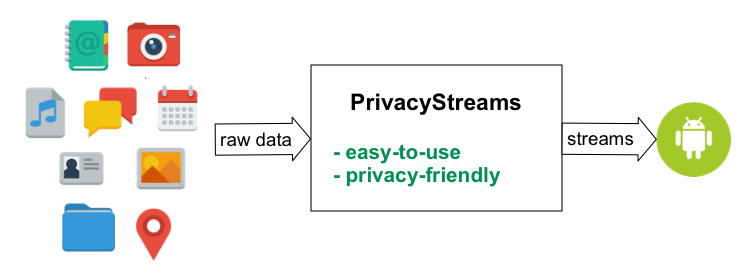PrivacyStreams
PrivacyStreams is an Android library for easy and privacy-friendly personal data access and processing. It offers a functional programming model for various types of personal data, including locations, photos, audios, sensors, contacts, messages, and more.
In PrivacyStreams, all types of personal data can be accessed and processed with a uniform query interface (UQI):
UQI.getData(Provider, Purpose).transform(Transformation).output(Action)
Where Provider, Transformation, Action are built-in functions and Purpose is a description to describe why the data is needed. Developers only need to find the proper functions to form a query. They don't need to deal with the complicated data formats, multi-threading, runtime permissions, etc.
Based on the functions used in the query and the purpose specified by the developer, PrivacyStreams is able to generate a privacy description, which can be a part of the app description or the privacy policy to help users understand what personal data is used in the app and why.
Quick examples
Get email addresses for all contacts.
/**
* Get emails addresses for all contacts on the device.
* Make sure the following line is added to AndroidManifest.xml
* <uses-permission android:name="android.permission.READ_CONTACTS" />
*/
public void getEmails(Context context) {
try {
List<List<String>> contactEmails = new UQI(context)
.getData(Contact.getAll(), Purpose.SOCIAL("recommend friends"))
.asList(Contact.EMAILS);
// Do something with contact emails
System.out.println("Contact emails: " + contactEmails);
}
catch (PSException e) {
e.printStackTrace();
}
}
Get the current location.
/**
* Get the current location.
* Make sure the following line is added to AndroidManifest.xml
* <uses-permission android:name="android.permission.ACCESS_COARSE_LOCATION" />
*/
public void getCurrentLocation(Context context) {
try {
LatLon latLon = new UQI(context)
.getData(Geolocation.asCurrent(Geolocation.LEVEL_CITY), Purpose.UTILITY("check weather"))
.getFirst(Geolocation.LAT_LON);
// Do something with geolocation
Log.d("Location", "" + latLon.getLatitude() + ", " + latLon.getLongitude());
}
catch (PSException e) {
e.printStackTrace();
}
}
Monitor location updates.
private static final double CENTER_LATITUDE = 40;
private static final double CENTER_LONGITUDE = -80;
private static final double RADIUS = 20.0;
/**
* Monitor location updates and callback when in a circular area.
* Make sure the following line is added to AndroidManifest.xml
* <uses-permission android:name="android.permission.ACCESS_FINE_LOCATION" />
*/
public void geofence(Context context) {
new UQI(context)
.getData(Geolocation.asUpdates(10*1000, Geolocation.LEVEL_EXACT), Purpose.GAME("notify user"))
.setField("inRegion", GeolocationOperators.inCircle(Geolocation.LAT_LON, CENTER_LATITUDE, CENTER_LONGITUDE, RADIUS))
.onChange("inRegion", new Callback<Boolean>() {
@Override
protected void onInput(Boolean inRegion) {
// Do something when enters/leaves region.
Log.d("Geofence", inRegion ? "entering" : "leaving");
}
}
);
}
Wait and read incoming SMS messages.
private static final String SERVER_PHONE_NUMBER = "123456789";
private static final String AUTH_MESSAGE_PREFIX = "Your code is ";
/**
* Wait for SMS messages and read the auth code
* Make sure the following line is added to AndroidManifest.xml
* <uses-permission android:name="android.permission.RECEIVE_SMS" />
*/
public void readAuthSMS(Context context) {
new UQI(context).getData(Message.asIncomingSMS(), Purpose.UTILITY("two-factor authentication"))
.filter(Message.TYPE, Message.TYPE_RECEIVED)
.filter(Message.CONTACT, SERVER_PHONE_NUMBER)
.filter(StringOperators.contains(Message.CONTENT, AUTH_MESSAGE_PREFIX))
.ifPresent(Message.CONTENT, new Callback<String>() {
@Override
protected void onInput(String text) {
String authCode = text.substring(13);
// Do something with the auth code
Log.d("Auth code", authCode);
}
}
);
}
Get local images in media storage.
/**
* Get local images in media storage.
* Make sure the following line is added to AndroidManifest.xml
* <uses-permission android:name="android.permission.READ_EXTERNAL_STORAGE" />
*/
public void getLocalImages(Context context) {
try {
List<String> filePaths = new UQI(context)
.getData(Image.getFromStorage(), Purpose.UTILITY("read photos"))
.setField("filePath", ImageOperators.getFilepath(Image.IMAGE_DATA))
.asList("filePath");
// Do something with the images
Log.d("Image paths", "" + filePaths);
}
catch (PSException e) {
e.printStackTrace();
}
}
Get microphone loudness periodically.
private static final long DURATION = 10 * 1000; // 10 seconds
private static final long INTERVAL = 10 * 60 * 1000; // 10 minutes
/**
* Get microphone loudness periodically.
* Make sure the following line is added to AndroidManifest.xml
* <uses-permission android:name="android.permission.RECORD_AUDIO" />
*/
public void getLoudnessPeriodically(Context context) {
new UQI(context)
.getData(Audio.recordPeriodic(DURATION, INTERVAL), Purpose.HEALTH("monitor sleep"))
.setField("loudness", AudioOperators.calcLoudness(Audio.AUDIO_DATA))
.forEach("loudness", new Callback<Double>() {
@Override
protected void onInput(Double loudness) {
// Do something with the loudness value.
Log.d("Loudness", "" + loudness + " dB.");
}
}
);
}
Installation
Option 1. Using Gradle (recommended for the most users)
Add the following line to build.gradle file under your app module.
dependencies {
// The following line imports privacystreams library to your app
compile 'io.github.privacystreams:privacystreams-android-sdk:0.1.7'
}
That's it!
Note that if you want to use Google location service instead of the Android location service, you will need one more step.
Option 2. From source (recommended for contributors)
In Android Studio, the installation involves the following steps:
- Clone this project to your computer.
- Open your own project, import privacystreams-android-sdk module.
- Click File -> New -> Import module....
- Select
privacystreams-android-sdkdirectory as the source directory.
- In your app module, add the following line to
dependencies:compile project(':privacystreams-android-sdk')
Documentation
Discussion
- GitHub issues
- Mailing list
- Contact the author
Acknowledgments
- CHIMPS Lab and SYNERGY Lab at Carnegie Mellon University.
- Icons from Paomedia on iconfinder.com
